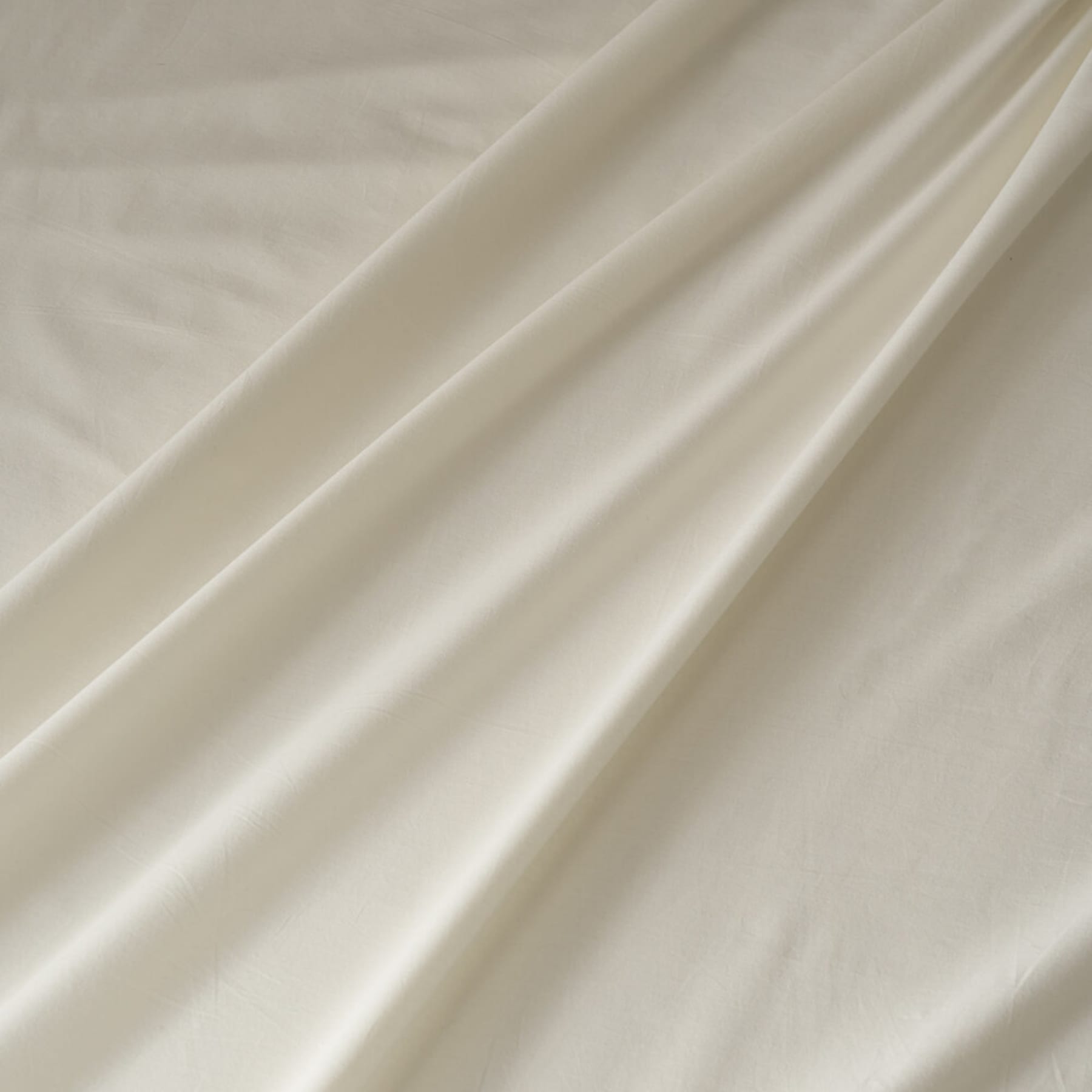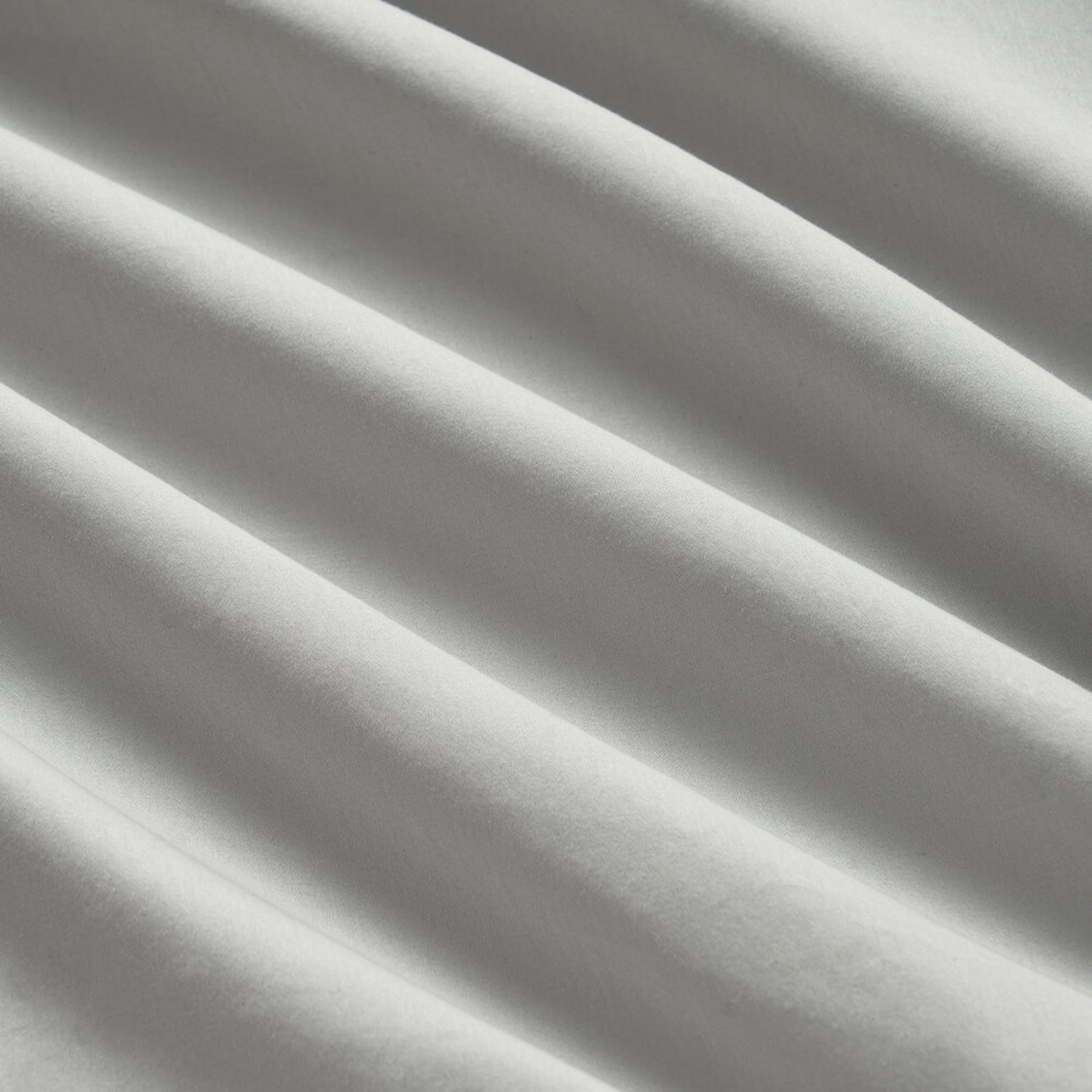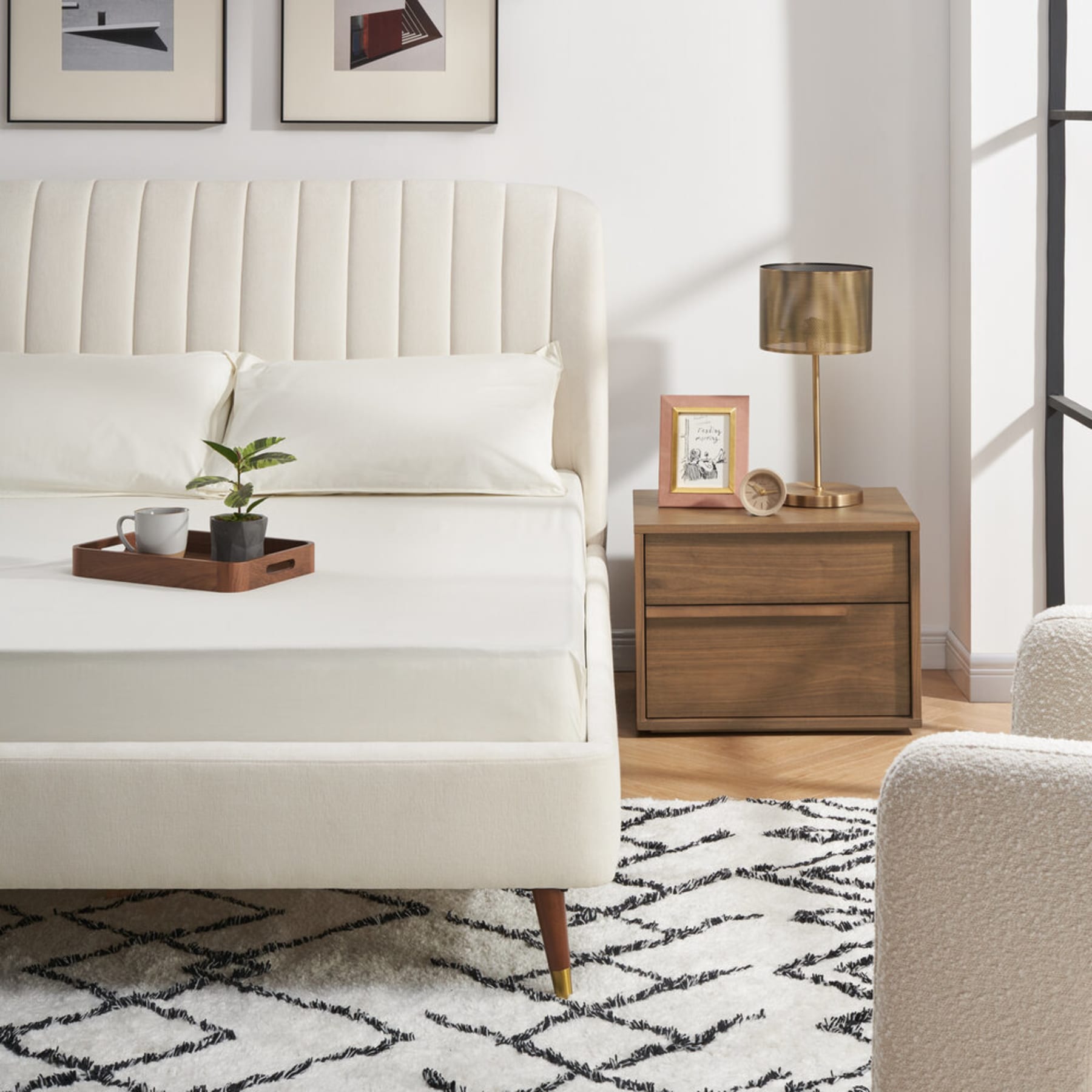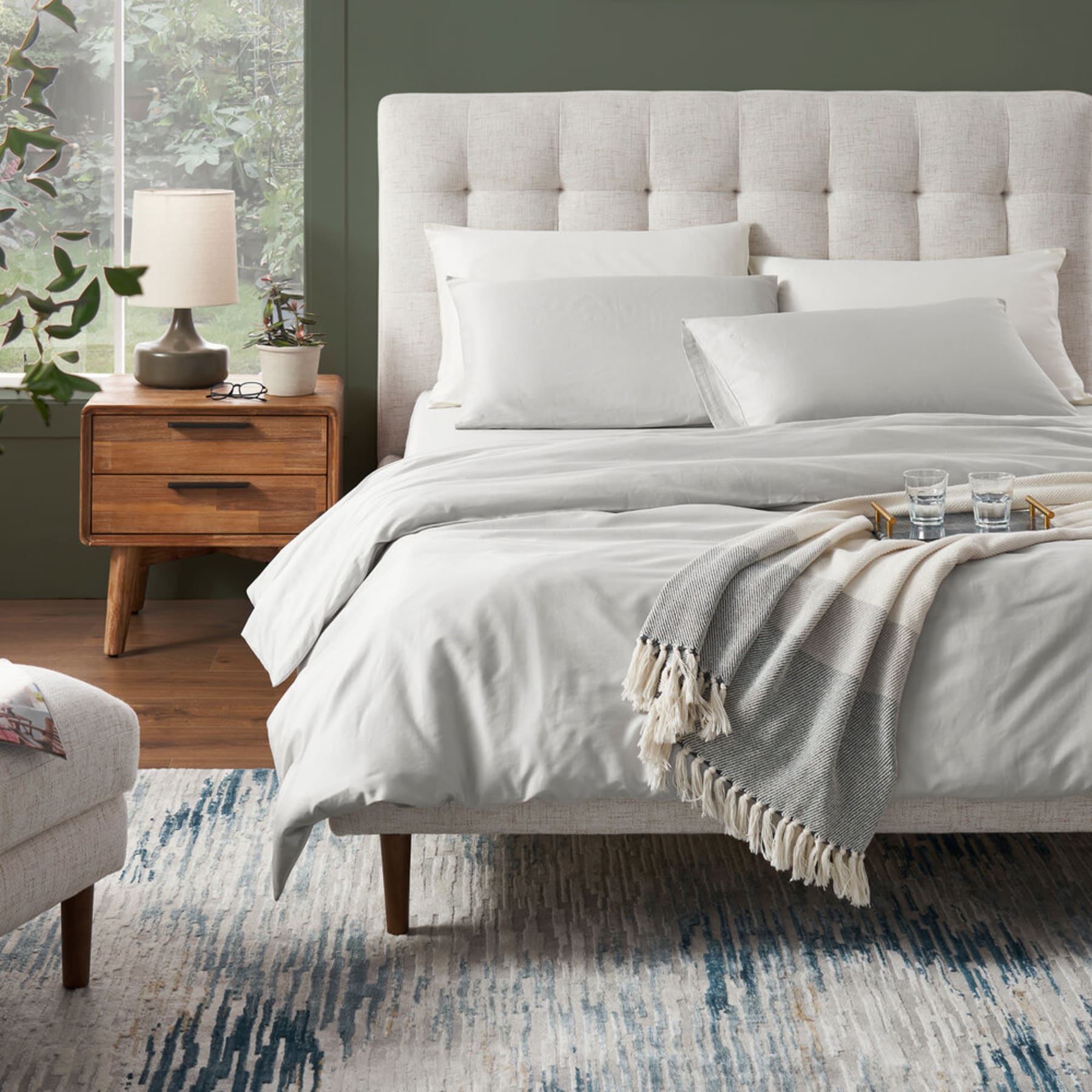
Percale vs Sateen Bed Sheets: What's the Difference?
When it comes to selecting bed sheets, the choices can be overwhelming. With a multitude of fabrics, weaves, and finishes available, it's important to understand the differences to ensure a comfortable and restful sleep.
Two popular bedding options that often leave many puzzled are percale and sateen bed sheets.
In this article, we’ll delve into the distinctive characteristics of percale and sateen, exploring their thread counts, textures, durability, and more. Let’s dive right in!
What are percale sheets?
Percale refers to a type of fabric weave that produces a crisp and cool texture, often described as having the same feel as a cotton shirt. It is typically made from combed cotton, but can also be crafted from other materials such as polyester or a blend of fibres.

Percale is highly breathable and has a crisp texture.
Percale sheets are known to be breathable and are particularly suitable for those who tend to sleep hot or live in warmer climates. The weave of percale sheets is characterised by a simple, one-over-one-under pattern, resulting in a matte finish.
What are sateen sheets?
Sateen is a fabric weave that creates a smooth and lustrous surface. Unlike percale, sateen is made using a satin weave structure, where multiple weft threads float over a single warp thread. This weaving technique imparts a silky feel and a subtle sheen to the fabric.

Sateen has a lustrous sheen and silky feel.
Sateen sheets are often made from combed cotton or a blend of cotton and synthetic fibres. The luxurious and glossy appearance of sateen makes it a popular choice for those who want to add a touch of elegance to their bedroom.
Percale and sateen thread counts
Thread count refers to the number of threads per square inch of fabric. It is often considered a crucial factor in determining the quality of bed sheets - but shouldn’t be the only factor in your decision-making.

The Percale Sheet Set in Cloud. Also pictured: The Lexi Tufted Bed.
Thread count does not necessarily indicate a lower quality like what most people believe. Percale sheets typically have a thread count ranging from 200 to 400. On the other hand, sateen sheets usually fall within the range of 300 to 600.
Percale’s lower thread count results in a crisp and lightweight bed sheet, while sateen’s higher thread count means it’s smoother and softer. So, depending on personal preference, you might prefer a cool feel compared to a thicker bed sheet, and vice versa.
Differences between percale and sateen sheets
Breathability
Due to their weave structure, percale sheets are highly breathable and lightweight, making an excellent choice for warmer climates or hot sleepers. It promotes airflow and keeps you cool through the night.
When compared to percale, sateen is not as breathable for those who are sensitive to heat. As it has a higher thread count compared to percale, sateen is usually thicker and heavier, which makes them prone to heat retention. This is great for cooler climates or those who prefer a warmer sleeping environment as it provides a snug and enveloping feel.
Durability
The tight criss-cross pattern of the percale weave makes them inherently more durable when compared to sateen. The tight weave minimizes the risk of threads pilling or breaking, resulting in a longer lifespan. This also allows percale sheets to maintain their integrity even after prolonged use and washing.
On the other hand, sateen sheets are more susceptible to pilling and snagging. The floating threads in the weave structure may be more prone to wear and tear over time, especially with rough handling or improper care.
Texture and feel
Percale sheets have a crisp and cool feel. They offer a smooth touch, giving off a classic, hotel-like vibe. Percale's lightweight and breathable nature make it an excellent choice for those who prefer a fresh and airy sleeping environment.
In contrast, sateen sheets have a silky, smooth texture that glides against the skin. They provide a luxurious feel similar to satin, without being too slippery. If you appreciate a softer, more indulgent feel, sateen may be the perfect choice for you.
Care and maintenance
Care and maintenance are important considerations for both percale and sateen bed sheets. Here are some best practices to take note of when washing both types of sheets:
Machine wash the sheets in cold or warm water on a gentle cycle. Avoid using hot water as this can cause damage to the fibres.
Avoid using harsh chemicals like bleach or fabric softeners as they can weaken the fabric and affect its performance.
When drying the sheets, air-dry them if possible. If not, throw them in the dryer with a low heat setting.
However, while neither is difficult to care for, sateen sheets are naturally wrinkle-resistant, unlike percale. Hence, to keep percale sheets crisp and tidy, you’d have to iron or press them regularly.

The Sateen Quilt and Sheet Set in Feather. Also pictured: The Madison Bed and Seb Bedside Table.
Percale vs sateen: Which is better?
We hope that this article has helped you understand the differences between both bed sheets. When it comes to deciding which is better than the other, there isn’t a straightforward answer as both percale and sateen have their benefits and drawbacks.
You may opt for percale sheets if you tend to sleep hot and prefer a crisp feel to your bedsheets. Sateen sheets have a glossy sheen and luxurious feel, and are also wrinkle-resistant, which might appeal to those who want to a add high-end look to their bedroom.
By considering various factors like your sleeping habits, lifestyle, and personal preferences, you can create a comfortable and inviting bed that suits your unique needs and enhances your sleep experience.
FAQs
What are cotton percale and cotton sateen?
This refers to the main fabric composition of the bed sheets. As percale and sateen are weaves, cotton percale and cotton sateen mean the sheets are made using cotton fabric in each specific weave. Though they are both made from cotton, the weave types have their own unique characteristics that make each bed sheet different.
Do hotels use percale or sateen?
If you’re wondering how to get the luxurious, high-end feel of hotel bedding - opt for cotton percale sheets. Hotels usually use cotton percale because percale is more breathable compared to sateen, and softens after every wash. The tight percale weaves give it that signature crisp and cool feel, which is what you will find in most hotels. Furthermore, cotton is the most common and fuss-free fabric that is highly durable, and is able to withstand commercial washing without compromising its performance and softness.